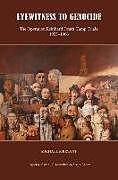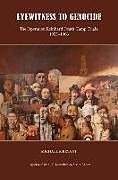Eyewitness to Genocide: The Operation Reinhard Death Camp Trials, 1955-1966
Einband:
Kartonierter Einband
EAN:
9781621902621
Untertitel:
The Operation Reinhard Death Camp Trials, 1955-1966
Genre:
Geschichte
Autor:
Michael Bryant
Herausgeber:
Univ Of Tennessee Pr
Anzahl Seiten:
326
Erscheinungsdatum:
26.08.2016
ISBN:
978-1-62190-262-1
Autorentext
Michael S. Bryant is a professor of history and legal studies at Bryant University. He is the author of Confronting the "Good Death" Nazi Euthanasia on Trial, 1945-1953.
Klappentext
One of the deadliest phases of the Holocaust, the Nazi regime's "Operation Reinhard"
produced three major death camps--Belzec, Treblinka, and Sobibor--which claimed the
lives of 1.8 million Jews. In the 1960s, a small measure of justice came for those victims
when a score of defendants who had been officers and guards at the camps were convicted
of war crimes in West German courts. The conviction rates varied, however. While all but
one of fourteen Treblinka defendants were convicted, half of the twelve Sobibor defendants
escaped punishment, and only one of eight Belzec defendants was convicted. Also,
despite the enormity of the crimes, the sentences were light in many cases, amounting to
>In this meticulous history of the Operation Reinhard trials, Michael S. Bryant examines
a disturbing question: Did compromised jurists engineer acquittals or lenient punishments
for proven killers? Drawing on rarely studied archival sources, Bryant concludes
that the trial judges acted in good faith within the bounds of West German law. The key
to successful prosecutions was eyewitness testimony. At Belzec, the near-total efficiency
of the Nazi death machine meant that only one survivor could be found to testify. At Treblinka
and Sobibor, however, prisoner revolts had resulted in a number of survivors who
could give firsthand accounts of specific atrocities and identify participants. The courts,
Bryant finds, treated these witnesses with respect and even made allowances for conflicting
testimony. And when handing down sentences, the judges acted in accordance with
>Yet, despite these findings, Bryant also shows that West German legal culture was
hardly blameless during the postwar era. Though ready to convict the mostly workingclass
personnel of the death camps, the Federal Republic followed policies that insulated
the judicial elite from accountability for its own role in the Final Solution. While trial
records show that the "bias" of West German jurists was neither direct nor personal, the
structure of the system ensured that lawyers and judges themselves avoided judgment.

Leider konnten wir für diesen Artikel keine Preise ermitteln ...
billigbuch.ch sucht jetzt für Sie die besten Angebote ...
Die aktuellen Verkaufspreise von 6 Onlineshops werden in Realtime abgefragt.
Sie können das gewünschte Produkt anschliessend direkt beim Anbieter Ihrer Wahl bestellen.
Loading...
Die aktuellen Verkaufspreise von 6 Onlineshops werden in Realtime abgefragt.
Sie können das gewünschte Produkt anschliessend direkt beim Anbieter Ihrer Wahl bestellen.
| # | Onlineshop | Preis CHF | Versand CHF | Total CHF | ||
|---|---|---|---|---|---|---|
| 1 | Seller | 0.00 | 0.00 | 0.00 |
